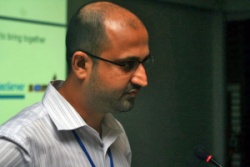 “Scientists from round the Pacific now have easier access to the Geographical information stored at Applied Geoscience and Technology Division (SOPAC), Secretariat of the Pacific Community,” said Mr Sachindra Singh, Systems Developer, SOPAC Information Communications Technology (ICT) Department.
“Scientists from round the Pacific now have easier access to the Geographical information stored at Applied Geoscience and Technology Division (SOPAC), Secretariat of the Pacific Community,” said Mr Sachindra Singh, Systems Developer, SOPAC Information Communications Technology (ICT) Department.
“Since August last year, the ICT Department has worked to unify and catalogue SOPAC's diverse geographical data collection under a standardised, secure and user-friendly system.”
Mr. Singh explained that this undertaking solely utilised Open Source Software (OSS) geospatial systems, which enabled the Division to cost-effectively develop the online solution in a relatively short amount of time.
Regional governments are actively seeking SOPAC’s assistance with the installation and training in OSS geospatial systems, which was initially funded through the Islands Information Systems Development Project (EDF8), because, Mr Singh said, OSS systems have very low total cost of ownership and will provide long-term sustainability to the region’s governments ICT services.
They are also recommended by major donor agencies such as United Nations Agencies, the European Union, World Bank, AUSAid and NZAid that fund Pacific-based projects, which are administered by SOPAC.
Speaking at the Geographical Information Systems (GIS)/Satellite Radar User Conference recently held in Suva, Ms Abigail Baca of the World Bank’s Washington–based Global Facility for Disaster Reduction and Recovery (GFDRR) endorsed SOPAC’s use of OSS.
“It is great to see SOPAC taking the lead in the Pacific in the use of open source software. There is a global movement towards using OSS tools that enable the easy sharing of data and applications to the mutual benefit of the larger community. Our research shows that there are enormous pay-offs for both developed and developing countries in using open source platforms for disaster risk management.”
Mr Singh said that SOPAC’s upgraded online platform not only makes the Division’s work more visible to the member countries and the general public, but “…will also prove endlessly useful to SOPAC staff in their day-to-day work. It is easier to share data and duplication of effort can be avoided.
“In the past, specialists within SOPAC have utilised a diverse set of tools to create, manage, analyse and display geospatial data on digital maps that have been acquired from a variety of different sources.”
The new system provides an up- to-date catalogue and a centralised data repository, or library of information.
Mr Singh said that apart from the financial benefits, OSS provides transparency. “ICT systems based on OSS are freely available and can be modified easily to suit very specific requirements. An organisation using OSS has more control over the privacy and security aspects, compared to closed-source “black box” solutions.
“OSS is a community effort, where people are encouraged to contribute their skills and time to provide improvements and support, which they do freely.
“OSS systems are the driving force in connecting people and processes globally in real time and giving smaller countries in the Pacific region equal footing in information technology. Ultimately, I believe, OSS is a more much beneficial and sustainable approach to ICT development in the region,” concluded Mr Singh.
Photo caption: SOPAC’s Sachindra Singh talks about Open Source Software at the recent GIS Conference in Suva.





